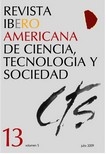Os franceses diante do meio ambiente, da ciência e da tecnologia
DOI:
https://doi.org/10.52712/issn.1850-0013-851Palavras-chave:
população, percepção, opinião, atitude, ciência, tecnologia, meio ambiente, FrançaResumo
Este artigo se interessa pela relação que os cidadãos franceses mantêm com o meio ambiente, a ciência e a tecnologia, com base nos resultados da pesquisa Valores, realizada por uma equipe de sociólogos e cientistas políticos reunidos na Associação para a Pesquisa sobre os Sistemas de Valores. Mais precisamente, busca compreender quais são as percepções, opiniões e atitudes da população do Hexágono sobre essas questões e os problemas decorrentes de suas interações. Fundamentalmente, avança a hipótese de que esse vínculo se estrutura em torno de três ideias centrais: 1) a adesão da cidadania francesa ao grande discurso ecológico, 2) o compromisso pessoal com a ecologia e 3) o questionamento da legitimidade da ciência e da tecnologia, especialmente a partir de uma reflexão sobre as consequências ambientais do desenvolvimento científico e tecnológico.
Downloads
Referências
ADOUE, C. y ANSART, A. (2003): “L’essor de l’écologie industrielle: une avancée vers le développement durable”, Futuribles, nº 291.
ATTAC (2004): Le développement a-t-il un avenir? Pour une société économe solidaire, Paris, Mille et une nuits.
BECKERMAN, W. (1992): “Economic growth and the environment: Whose growth?Whose environment?”, World Development, Vol.20, nº 4.
BECKERMAN, W. (1994): “Sustainable development: is it a useful concept?”, Environmental Values, Vol. 3.
BESSET. J-P. (1992): René Dumont, une vie saisie par l’écologie, Paris, Stock.
BOZONNET, J-P. (2005): “L’écologisme en Europe: les jeunes désertent”, en O. Galland y B. Roudet: Les jeunes Européens et leurs valeurs, Europe occidentale, Europe centrale et orientale, Paris, La Découverte, pp. 147-176.
CURNIER, J-P. (2000): L’écologie politique. L’oeuvre en surplomb, Paris, Sens et Tonka.
DUNLAP, R., VAN LIERE. K.D., MERLING, A.G. y JONES, R.E. (2000): “Measuring Endorsement of the New Ecological Paradigm: A Revisited NEP Scale”, Journal of Social Issues, Vol. 56, nº 3, pp. 425-442.
EHRLICH, P.R., EHRLICH, A. y HOLDREN, J.P. (1973): Human ecology: problems and solutions, San Francisco, W.H. Freeman.
FREMION, Y. (2002): L’écologie politique en France: 1968-2001, Paris, Hoëbeke.
GORZ, A. (1991): Capitalisme, socialisme et écologie, Paris, Galilée.
HOURCADE, J.C., SALLES, J-M. y THERY, D. (1992): “Ecological economics and scientific controverseries. Lessons from some recent policy making in the EEC”, Ecological Economics, Vol. 6.
ILLICH, I. (1973): La convivialité, Paris, Seuil.
LIPIETZ, A. (2002): René Dumont. 1904-2001, Paris, Encyclopaedia Universalis.
LIPIETZ, A. (1999): Qu’est-ce que l’écologie politique? La Grande Transformation du XXIè siècle, Paris, La Découverte.
MAYER, N. (2002): “La consistance des opinions”, en Grunberg, G., Mayer, N. y Sniderman, P.M.: La démocratie à l’épreuve. Une nouvelle approche de l’opinion des Français, Paris, Presses de Sciences Po, pp. 19-49.
MEADOWS, D.H., MEADOWS, D.L., RANDERS, J. y BEHRENS. W.W. (1972): The Limits to Growth, New York, Universe Books.
MEADOWS, D.H. (1991): The Global Citizen, Island Press.
ODUM, E.P. (1971): Fundamentals of Ecology, Philadelphia, W.B. Saunders.
SMITH, F.L. (1997): “La protection de l’environnement par la privatisation écologique: un paradigme pour la réforme environnementale”, en M. Falque y M. Massenet: Droits et propriété et environnement, Paris, Dalloz.
VIVIEN, F-D. y ZUINDEAU, B. (2001): “Le développement durable et son espace: antécédents intellectuels et questions pour l’avenir”, Cahiers lillois d’économie et de sociologie, nº 37.
Downloads
Publicado
Como Citar
Edição
Seção
Licença
Copyright (c) 2025 CC Attribution 4.0

Este trabalho está licenciado sob uma licença Creative Commons Attribution 4.0 International License.
Todas os números de CTS e seus artigos individuais estão sob uma licença CC-BY.
Desde 2007, a CTS proporciona acesso livre, aberto e gratuito a todos seus conteúdos, incluídos o arquivo completo da edição quadrimestral e os diversos produtos apresentados na plataforma eletrônica. Esta decisão é baseada no entendimento de que fornecer acesso livre aos materiais publicados ajuda a ter uma maior e melhor troca de conhecimentos.
Por sua vez, em se tratando da edição quadrimestral, a revista permite aos repositórios institucionais e temáticos, bem como aos sites pessoais, o autoarquivo dos artigos na versão post-print ou versão editorial, logo após da publicação da versão definitiva de cada número e sob a condição de incorporar ao autoarquivo um link direcionado à fonte original.











